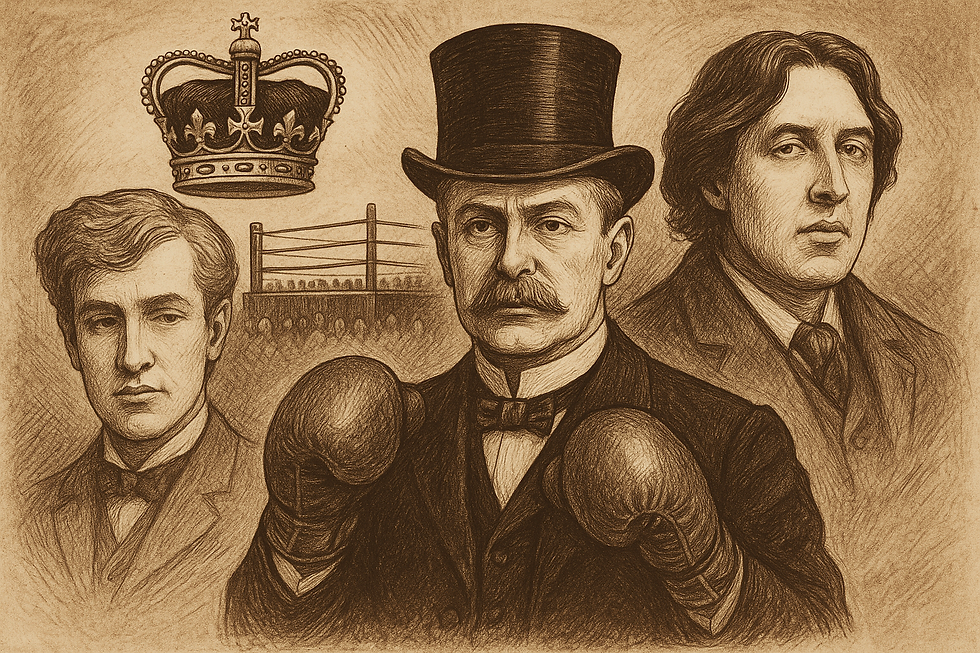The Pankration Blog Begins at the Beginning
- Christopher Libertelli

- Jul 23
- 3 min read
Updated: Jul 24

The 9th Marquis of Queensberry is credited with developing the rule-set for modern boxing—the now-famous Queensberry Rules. Instituted in 1867, the rules introduced gloves, timed rounds, and a ban on wrestling—turning chaotic prizefights into codified sport.
But this Marquis, a so-called gentleman of the ring, was also a man of bitterness and vendetta. He despised his son Alfred “Bosie” Douglas’s relationship with none other than Oscar Wilde, and set in motion a legal attack that led to Wilde’s conviction for “gross indecency.” Wilde was sentenced to two years of hard labor—a punishment that shattered his health and ended his career. He died in Paris in 1900, just three years after his release. And so is it an exaggeration that the father of modern boxing’s homophobic rage destroyed one of modern literature’s greatest voices? If so, the story Emile Griffith described later in this blog, suggests that what goes around comes around and that Mike Tyson understood where rage comes from.
Going back even further, the history of what we might call ‘professional’ fighting didn’t begin in Victorian England it stretches back to Pankration, a brutal blend of wrestling and striking introduced at the 648 BCE Olympics which were known then as the 33rd Olympiad. The Greeks considered it the ultimate test of combat. It was less stylized than boxing and more primal than wrestling. Many of the participants believed they were charged by their gods to fight as an offering to Olympia and Zeus.
No gloves. No rounds. No water. No sportsmanship or sponsorship. Just pain and endurance. The people who created and sanctioned these ancient events were known as Hellanodikai - elites of society that were considered the arbiters of what was a ‘combat sport’ and what was not. In this way, the 9th Marquis of Queensbury is like the Hellanodikai of 648 BCE (and later, as we shall see, like Senator McCain).
Why then, from the very beginning of professional fighting, have we allowed elites, aristocrats or people who claim some status over the fighters to run the show? The reason may lie in the history and legal status of fighting. Seeing things through this lens also explains why local police were often involved in the history of boxing. From the very beginning of civilization, societies outlawed fighting and violence that led to things like murder. It's just what you do when you are coming up with the rules of your new society: tell people to not kill or fight with each other. Simple.
And so in The Marquis’ time of Victorian propriety, when a boxing match took place it was society legalizing conduct that would otherwise send the fighters to jail - but only within the parameters of the ring and according to the rules. The Crown was concerned that this sanctioned fighting could get out of control and mayhem might spill out of the ring. This is not a crazy worry. Queen Victoria needed someone trusted to oversee these raucous early fights and ensure that if there were to be any messiness after a bout, it would be contained and not lead to a riotous panic of illegality.
So it's possible to see The Marquis as Queen Victoria’s man to keep this whole boxing thing in check. Of course, Aristocrats in 1800s England didn’t actually do much of anything except be aristocrats and boxing’s rules are no exception. The rules were actually developed by The Marquis’ friend John Graham Chambers. The Marquis lent his aristocratic endorsement to them in an effort to gentrify the sport and make it more acceptable to other aristocrats who thought fighting was an ugly pastime that should be limited to the lower classes if allowed at all.
So whether it was Greek elites legitimizing fighting by including it in the 33rd Olympiad or The Marquis of Queensbury cleaning up boxing, combat sports have always needed some kind of legitimation from the sovereign or elites to ensure the integrity of the sport. Without it, fighting is just criminal.
Odds are that Turki Alalshikh is quite aware of this history…




Comments